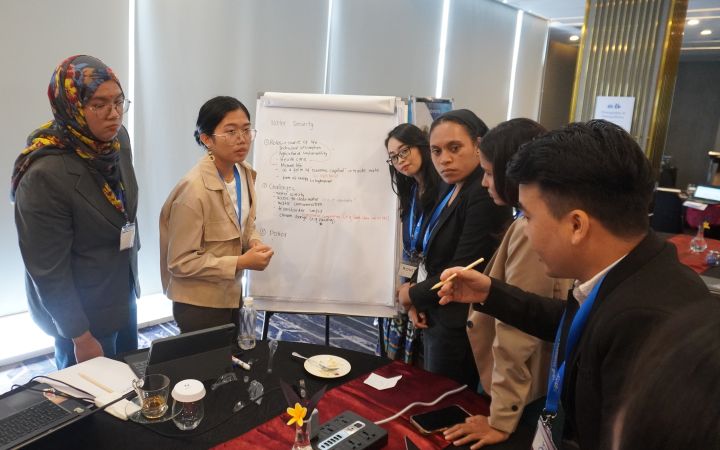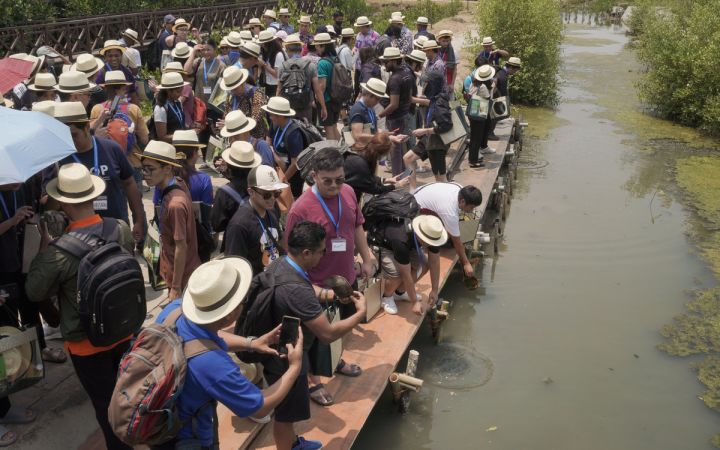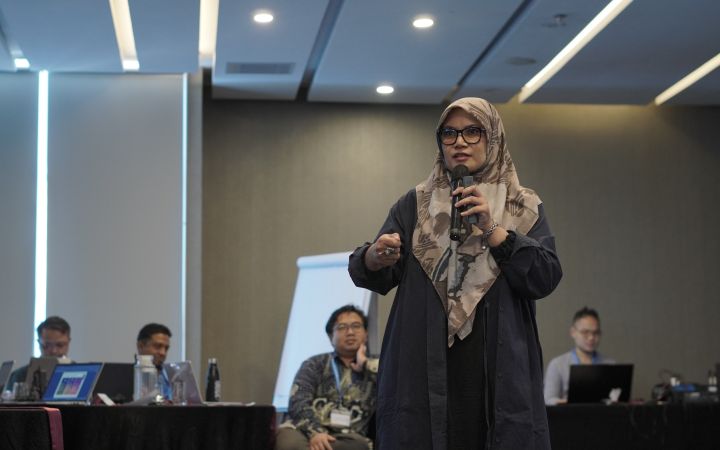the UNITAR-organized workshop in Jakarta, as part of the second phase of the "Leaders for a Free and Open Indo-Pacific: Sea and Human Security" training programme (funded by the Government of Japan), has been completed.
19 September 2024, Jakarta - On 19 September 2024, around 80 participants of the "Leaders for a Free and Open Indo-Pacific: Sea and Human Security" training programme showcased their group projects, envisioning the solutions for the unique sea and human security challenges in their communities.
The presentations were the culmination of the programme's 10-day workshop in Jakarta for public and private sector leaders from 12 Asian countries. Through the workshop, run by the United Nations Institute for Training and Research (UNITAR) with financial support from the Government and People of Japan, the participants gained knowledge and skills to tackle pressing issues related to sea and human security in the Indo-Pacific region.
LEARNING FROM FIELD EXPERIENCES, EXPERTS AND PEERS
Over the 10 days, the participants learned through expert-led special lectures, a study tour in Tangerang, group work and mentoring sessions, which enhanced their insights and understanding of sea and human security.
One of the programme highlights was a study tour in Tangerang on 12 September, where the participants visited Urban Aquaculture Site. Through this study tour, participants deepened their knowledge of sustainable aquaculture practices through hands-on activities, including mangrove planting. They also received training from local experts and raised their awareness of how mangroves help sustain coastal livelihoods and combat climate change.
The special lectures covered topics of environmental, maritime and food security, gender equality, climate change, fundraising, youth empowerment, blue economy, and leadership development. While scaling up their capacity and leadership skills, each participant developed a project plan that addressed a specific issue in their community and worked in sector-based groups to brainstorm policy recommendations for their region, envisioning solutions for various sea and human security issues.
CONCLUDING THE WORKSHOP AND WAY FORWARD
At the closing event of the workshop on 19 September, Chisa Mikami, Head of the UNITAR Hiroshima Office, congratulated the participants for their collaborative achievements, which embodies "the regional spirit." She encouraged the participants to nurture the meaningful connections they have built during this workshop, and to leverage these relationships as they continue to collaborate and address sea and human security challenges in their respective communities and in the Indo-Pacific region.
Mr. Masahiko Kiya, the Ambassador of Japan to ASEAN, also participated in the closing event and delivered a congratulatory remark to the participants. In his encouraging speech, he emphasized the significant role of the FOIP concept in enhancing connectivity and fostering the Indo-Pacific region into a place where freedoms from force or coercion and the rule of law can prosper. He also expressed appreciation for the programme to establish learning opportunities for leaders across Asian countries, which will immensely benefit their future careers.
In concluding the workshop, UNITAR hosted the certification award ceremony as a sign of revering around 80 passionate participants and celebrating the completion of the workshop. Ambassador of Japan to ASEAN, Mr. Masahiko Kiya handed over the certificates to participants.
UNITAR would like to express heartfelt appreciation for the continued support from the Government and People of Japan and for the warm support from the Government of Indonesia.
ABOUT THE LEADERS FOR A FREE AND OPEN INDO-PACIFIC (FOIP): SEA AND HUMAN SECURITY PROGRAMME
"The Leaders for a Free and Open Indo-Pacific: Sea and Human Security" training programme (June 2024 to February 2025) aims to provide participants with the skills and knowledge to enhance climate, social, economic, food and maritime security and to establish a coordination mechanism across the Indo-Pacific. It is implemented by UNITAR and funded by the Government and People of Japan.
The first phase of the programme, which ended in August 2024, over 400 learners completed two months of online learning. The Jakarta workshop is the programme's second phase, providing hands-on learning opportunities for a selected approximately 80 participants from Asia. Another workshop will be held in Nadi, Fiji, in October 2024 for nearly 80 Pacific participants. The third and last phase will invite the top 50 performers from Asia and the Pacific combined to an in-person workshop in Japan, scheduled for February 2025.
The programme is part of the broader "Shimanami Collective" initiative, a Japan-supported series of training programmes, which aims to build resilience against disasters and enhance sea and human security. The initiative particularly focuses on empowering youth and women in the Asia-Pacific region.
about unitar
The United Nations Institute for Training and Research (UNITAR) is a dedicated training arm of the United Nations. In 2023, UNITAR trained over 540,000 learners around the world to support their actions for a better future. In addition to our headquarters in Geneva, we have offices in Hiroshima, New York and Bonn and networks around the world.









